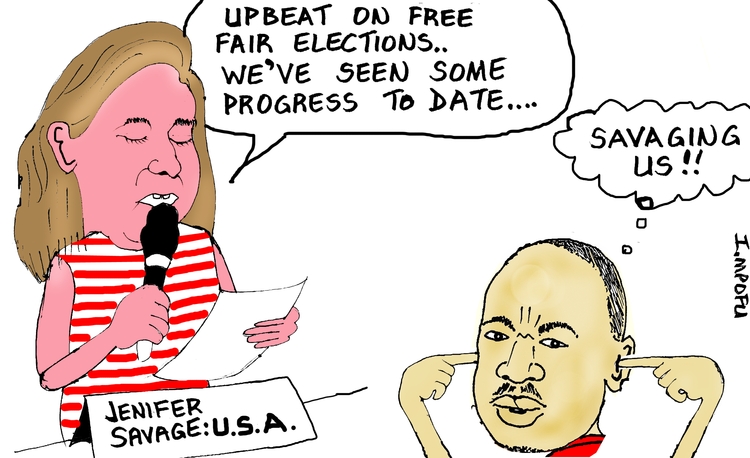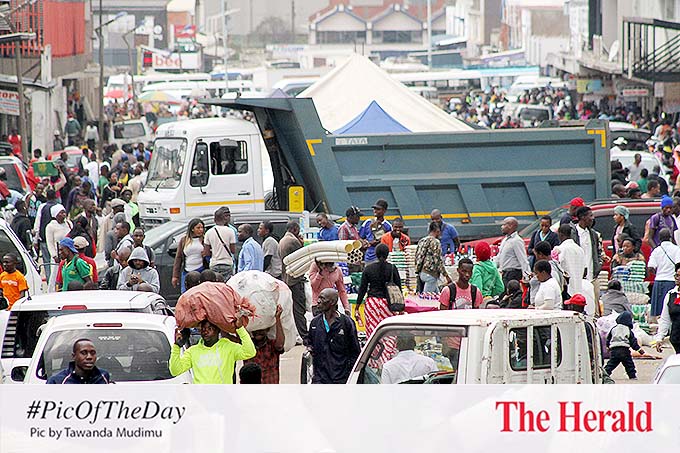Manatsa revisits legendary Rufaro wedding

Godwin Muzari Memory Lane
Zexie Manatsa was so passionate about music that he christened his children after his band. The yesteryear music legend fronted the Green Arrows Band that had hits like “Chipo Chiroorwa”, “Tea Hobvu” and “Chechule Anavhala Bottom”.
When he named the band in the mid ‘70s, Manatsa was envisaging the sharpness of arrows and the colour green, which symbolises eternal life. His were not only arrows, they were arrows with eternal life. What a name!
Local band names are rarely well thought out. It is usually a case of supporting any word with terms like ‘‘brothers’’, ‘‘express’’, ‘‘boys’’, ‘‘sounds’’ and (the funniest of them all) ‘‘orchestra’’. An orchestra has an average of 100 members playing different instruments with directions from a conductor.

MEMORIES . . . Manatsa and his wife hold a poster of their 1979 wedding
One might be tempted to ask what is orchestral about our own Orchestra Mberikwazvo, Orchestra Dendera Kings, Orchestra Ndoozvo, Orchestra Vazvamburi and Jah Jecha’s Orchestra Mapisi Endenge, but it is not essential. They are just stage names.
Well, back to Manatsa and Green Arrows. After selecting the name that he thought would suit the band well, Manatsa did not end there. The passion is evident in his first three sons’ names.
His first born is called Green and the musician says the other two names — Aaron and Benjamin — were meant to rhyme with ‘‘arrows’’ and ‘‘band’’ respectively to replicate Green Arrows Band. Benjamin is musician Tendai Manatsa’s other name.
These are the first three of six sons that Manatsa has with his wife Stella (nee Katehwe), but one thing that most people who followed the musician remember is the couple’s legendary wedding at Rufaro Stadium on August 25, 1979. And the couple was all smiles yesterday when they went down memory lane and shared what they remember about their historic wedding.
Before saying much during yesterday’s interview at their Westgate house, Manatsa was quick to brag that he is one of the few, if any, secular musicians of his era that have stayed with their first wives. Manatsa still has the poster of the wedding neatly folded somewhere in his archives. The memory is sweet.

FLASHBACK . . . Zexie Manatsa and his wife Stella during their wedding at Rufaro Stadium in 1979
“It was a big day for us. We never had a proper plan for that wedding. It just came to my mind after we were not impressed by the way a district office in Rusape had attempted to formalise our union. We had to get a real wedding certificate from magistrate’s courts or from church,” Manatsa recalled.
“Oliver Mtukudzi had done his wedding at Gwanzura Stadium earlier that year and we felt we could do the same. We chose Rufaro Stadium because we knew people would come in numbers. Indeed the stadium was filled to capacity. It was no ordinary wedding ceremony. It was more of a show because many musicians performed.
Thomas Mapfumo, Tineyi Chikupo, Manu Kambami and many others performed on the day. Mtukudzi was supposed to perform but he had an urgent commitment on the day.”
Manatsa said it was like a dream as they made their way from Highfield where a reverend had solemnised their marriage at church. He said a huge convoy made its way to Mbare and they met most fans that cheered them along the way.
“There were drum majorettes near Zimbabwe Broadcasting Corporation’s Mbare studios waiting to accompany the convoy to Rufaro. We saw how the stadium was packed while we were still outside. As we got in there were wild cheers.
“Thomas Mapfumo was on stage and he announced our arrival in exciting way. People pressed towards the fence surrounding the soccer field and there was a stampede. There was more excitement when Chikupo played ‘‘Sirivhia (Hande Kumagobo)’’. Green Arrows also performed, but I did not go on stage. It was an honour because all those people that filled the stadium had paid to attend the wedding. We also made a lot of money.”
Mai Manatsa also shared her memories of the wedding and she also spoke about the previous day when a ceremony for friends and relatives was held.
“We can say it was a two-day ceremony. The day before the wedding we invited friends and relatives to our house in Southerton and we had a big party. We bought a beast in Epworth. It was slaughtered, but we did not cut off any pieces. It was in a storeroom and everyone who came would cut a piece of their choice and take it for braai. People really had fun,” she recalled.
Manatsa had become a popular musician because of his early hits and he was among the top artistes that time.
He was enjoying the peak of a career that started in Mhangura when he would play home-made guitars with his brother Stanley at a farm where they grew up. When their parents struggled to pay school fees for them, they accepted an invitation to perform at a club in Chinhoyi over school holiday.
When the owner of the club failed to pay them, they took his guitars and fled to Bulawayo where their brothers stayed. They met musicians that were working with Jairos Jiri and they caught the attention of the band leader when they were given a trail slot. They worked with Jairos Jiri for some months before being employed by a club owner.
Manatsa got a job at a confectionery company and would do music at night when he came from work. When the company transferred him to Harare, Green Arrows failed to sustain the club contract without Manatsa and they followed him.
“I had to look for a slot for the band and I went kwaBhora (Murewa) where we got a contract at Makanda Nightclub. We made waves in the area and people would travel from Harare for our shows. It was difficult for me to balance music and work. I began giving endless excuses to get time from work until my employer discovered that I was doing music in Murewa. She allowed me to continue doing music and said I was free to return to work when need arose.”
A South African producer, West Nkosi, heard about Green Arrows when he came to Harare and approached Manatsa for recording. His first recording was “Chipo Chiroorwa” that became an instant hit. That was the beginning of his successful career that saw him performing in many parts of the country.
He continued making hits until hell broke loose in 1987 when he was involved in an accident that left him in a comma for three weeks.
It took time to recover and things started going bad for the band.
Manatsa tried to reignite his career, but the going became tough. He lost his house in Southerton, cars and other properties. Manatsa and his wife decided to turn to God in 1994 when they had relocated to Bulawayo.
“We were coming from a bar and we heard people singing and we just went there for fun. We did not know that God was calling us. That was the day we gave our lives to Jesus. We have never looked back since then,” said Manatsa.
They both enrolled for theological training a year later and became ZAOGA Church pastors in 1998. They have been serving the church since then and they are currently pastors for the Westgate branch of the church.









Comments